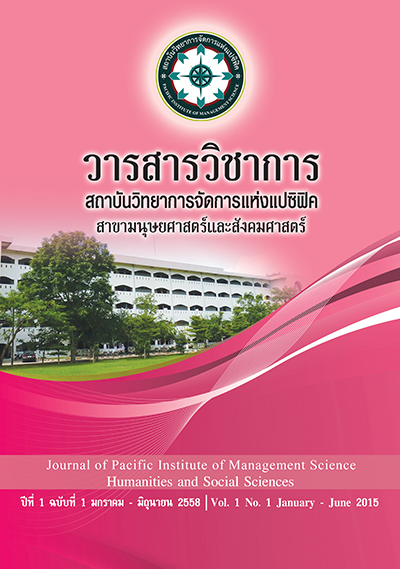The Leadership of Entertainment Entrepreneurs and Motivation in the Life of Employee
Keywords:
Entrepreneurship, motivation, facilityAbstract
The purposes of this research were to study and compare the leadership of entertainment entrepreneurs and motivation in the life of employees by personal factors. The leadership of entertainment entrepreneurs affected the motivation of employees in the facility. The samples were 400 employees which working in entertainment entrepreneurs. The statistic for analysis were frequency, percentage, average, standard deviation test for the test, one-way analysis of variance, Scheffe’s test, and multiple regression by stepwise. The results of this research were as follows; The leadership of entertainment entrepreneurs were at high level, idealized influence was the first, the next were inspiration motivation, good person and virtue, and individualized consideration respectively. The motivation in the life of entertainment officers were at high level for example ; work everything for the income to feed oneself and a family, the next were seek the thing that make a mistake and seek settlement. The comparison leadership character of entertainment entrepreneurs by personal factors of employees found sex, age, education level had difference opinion in overall and each item of leadership character. The comparison motivation in the life of entertainment officers by personal factors of employees found sex, age, monthly income and association friend character were not difference the opinion. The leadership of entertainment entrepreneurs and motivation in the life of entertainment officers were relate in overall and each item at .01 statistic significant. The deteriorate multiple result; idealized influence, inspiration motivation and individualized consideration respectively can predict the motivation in the life of officers were at .01 statistic significant. The interviewing entrepreneur found entertainment entrepreneurs wants to encourage give an officer had good life torn the budget in the push develops an officer. The interviewing officers found the officer in the entertainment want to have the income treats a family, want to alive the improve, and want to have the business is belong to oneself.
References
ความสำเร็จในกำรประกอบการของวิสาหกิจขนาดกลางและขนาดย่อม. รายงานการวิจัยทุนสนับสนุน.
มหาวิทยาลัยเกษตรศาสตร์.
กมลวรรณ ชัยวานิช.(2536). ปัจจัยที่เกี่ยวข้องกับผู้บริหำรที่สัมพันธ์กับประสิทธิผลของโรงเรียนเอกชน. ปริญญานิพนธ์
การศึกษาดุษฎีบัณฑิต มหาวิทยาลัยศรีนครินทรวิโรฒ.
กระทรวงมหาดไทย. (2548).รายงานคุณภาพชีวิตคนไทยจากข้อมูลความจำเป็นพื้นฐาน (จปฐ.) ปี 2548. กรุงเทพฯ:
ศูนย์สารสนเทศเพื่อการพัฒนาชุมชน.
กัญญารัตน์ ปานแก้ว.(2555). การสร้างแรงจูงใจในการดำเนินชีวิต. [ออนไลน์]. เข้าถึงได้จาก: https://www.learners.
in.th/blogs/posts/267866
กิตติ ตยัคคานนท์. (2530). เทคนิคการสร้างภาวะผู้นำ. กรุงเทพฯ : รุ่งวัฒนาการพิมพ์.
กันตยา มานะกุล. (2550). การพัฒนาคุณภาพชีวิตโดยยึดปรัชญำเศรษฐกิจพอเพียง: กรณีศึกษาชุมชนบ้านจอมจันทร์
หมู่ที่ 2 ตำบลสันทราย อำเภอแม่จัน จังหวัดเชียงราย. ปริญญาดุษฎีนิพนธ์การศึกษาดุษฎีบัณฑิต. สาขาวิชาการ
ศึกษาผู้ใหญ่. มหาวิทยาลัยศรีนครินทรวิโรฒ.
เกวลี เตรียมแจ้งอรุณ. (2552). “กำรจัดกำรปัญหาพฤติกรรมเด็กป๋า/เด็กเสี่ยของนักศึกษาหญิงแบบเชิงรุก.” วารสารการ
ศึกษาและพัฒนาสังคม. ปีที่ 5 ฉบับที่ 1-2:177-178.
สุรพงษ์ ยิ้มละมัย. (2550). ชีวิตและอัตลักษณ์ของผู้หญิงขายบริการบริเวณชายแดนภาคใต้. ปรัชญาดุษฎีบัณฑิต
สาขาวิชาไทศึกษา มหาวิทยาลัยมหาสารคาม.
สำนักงานกองทุนสนับสนุนการสร้างเสริมสุขภาพ. (2555). ความฉลาดทางอารมณ์หรือ EQ.[ออนไลน์]. เข้าถึงได้จาก:
https://www.thaihealth.or.th/healthcontent/article/28748 .
_____.(2556). วิธิสร้างแรงจงูใจในชีวิต. [ออนไลน]์. เข้าถึงได้จาก: https://www.thaihealth.or.th/healthcontent/
article/34210 ค้นเมื่อ 9 ตุลาคม 2556.
สำนักบริการข้อมูลและสารสนเทศ.(2555). พฤติกรรมมนุษย์.[ออนไลน์]. เข้าถึงได้จาก: https://www.idis.ru.ac.th/
report/index.php?topic=84.0
สำนักบริการข้อมูลและสารสนเทศ.(2555). พฤติกรรมมนุษย์กับการพัฒนาตน. [ออนไลน์]. เข้าถึงได้จาก:https://www.
idis.ru.ac.th/report/index.php?topic=102.0
องค์ประกอบของผู้นำ. (2555). [ออนไลน]์. เข้าถึงได้จาก: https://reg.ksu.ac.th/teacher/supavadee/mbaleader.html
อาพร(นามสมมติ).(2556). สัมภาษณ์. วันที่ 24 พฤษภาคม 2556.
อาภรณ์ ภู่วิทยพันธุ์. (2551). กลยุทธ์การพัฒนาทรัพยากรมนุษย์. กรุงเทพฯ: เอช อาร์ เซ็นเตอร์.
Anita E. Woolfolk. (1995). Educational Psychology. Toronto: Allyn & Bacon.
Baron, R. A. (1996). Psychology. 4th ed.Boston: Allyn&Bacon.
Bass,Bernard M. (1997). Dose the Transactional Transformational Leadership Paradigm Transcend
Organizational and National Boundaries?. American Psychologist, 52: 152.
Downloads
Published
Issue
Section
License
บทความที่ได้รับการตีพิมพ์เป็นลิขสิทธิ์ของ สถาบันวิทยาการจัดการแห่งแปซิฟิค
ข้อความที่ปรากฏในบทความแต่ละเรื่องในวารสารวิชาการเล่มนี้เป็นความคิดเห็นส่วนตัวของผู้เขียนแต่ละท่านไม่เกี่ยวข้องกับสถาบันวิทยาการจัดการแห่งแปซิฟิค และคณาจารย์ท่านอื่นๆในสถาบันฯ แต่อย่างใด ความรับผิดชอบองค์ประกอบทั้งหมดของบทความแต่ละเรื่องเป็นของผู้เขียนแต่ละท่าน หากมีความผิดพลาดใดๆ ผู้เขียนแต่ละท่านจะรับผิดชอบบทความของตนเองแต่ผู้เดียว







